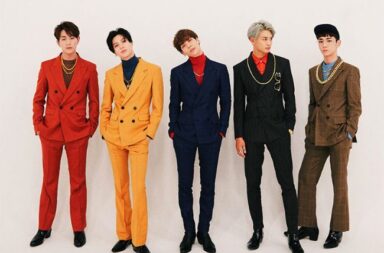 Recently, the now infamous documentary, Nine Muses of Star Empire, made its North American premier in New York City. With it’s second showing on the 30th (today!), we figure it’s time that we give it its due coverage. Spoilers ahead!
Recently, the now infamous documentary, Nine Muses of Star Empire, made its North American premier in New York City. With it’s second showing on the 30th (today!), we figure it’s time that we give it its due coverage. Spoilers ahead!
While Nine Muses debuted in 2010 under Star Empire Entertainment, it is only recently that they have found relative success with “Dolls” and “Wild,” both released earlier this year. These two singles also shows leaps of improvements when compared to their debut single, “No Playboy.” In the three years that Nine Muses has been on the K-pop scene, they have had member changes, from losing two members, to adding two members, to a member leaving and then coming back after three months. They’ve somehow managed to keep relevant enough without fading into oblivion as their music and concepts evolved to become better.
These girls first sparked my interest when last November, this teaser for their documentary was released. It was rather strange, a documentary covering their pre-debut days and their debut but shown after their debut. It’s usually the other way around. The teaser not only gives us statistics about the market of K-pop but also some scenes from the documentary itself. From a scene where one girl is sick yet does not tell her manager, to a member (Sera) declaring that “Nobody treats me as a human being.”
[youtube http://www.youtube.com/watch?v=PtXbLyFtpqA]
A collaboration between Minch & Films and the Chosun Ilbo, the teaser teased of a documentary of what Nine Muses has had to go through to debut. But what is really striking is that this was not produced and aired by one of the usual suspects (SBS, Mnet, SBS MTV). Rather, this was produced for an international audience. Specifically, the documentary, Nine Muses of Star Empire, was premiered at the 2012 International Film Festival in Amsterdam. However, the documentary only surfaced online after BBC World broadcasted a shortened version of the 82-minute documentary in February 2013.
Different from most pre-debut shows following the debut of a K-pop idol, this documentary shows an unglossed version of what happens behind the scene. It follows Nine Muses for one year and can be divided into two parts: pre-debut and post-debut.
In the first half, we get several interviews with some of the people in charge. Two of the most memorable were with the CEO, Shin Joo-hak, and the PR Director, Nam Ji-yeon. From the interviews, we learn just how much goes into making a debut (for Nine Muses, it was one million US dollars) and how long it takes to train an idol group (3-5 years with 2-3 years as the minimum training time in this case).
We also see the girls being coached on how to answer in interviews. When asked, “What is the concept of your costume?” one of the members, Min-ha, answers with the practiced line: “To emphasize our beauty. The costume is designed to highlight our legs.”
 This then takes us to a sneak peek into the concept meeting where the CEO states that the “concept is to be sexy but not cheap or trashy” while telling the stylists to make their clothes shorter.
This then takes us to a sneak peek into the concept meeting where the CEO states that the “concept is to be sexy but not cheap or trashy” while telling the stylists to make their clothes shorter.
Apart from this, we also see the changes in the lineup even before debut. When a member leaves the group, Hyun-a is then added. What is interesting is how. She is added after a meeting with what seems to be a talent agency. The CEO meets with someone and binders are taken out with pictures of girls, all categorized into just what the CEO is looking for.
The documentary also follows the original leader, Sera, as she tries to make things work. As a leader, she is blamed when something wrong happens and she goes as far as to cover up for her members who lack the discipline to even show up to practice regularly. After the addition of Hyun-a, an older member, the group dynamics change and this leads the company to unilaterally declare that Sera was no longer the leader and would be replaced by the eldest member, Lana. Even when Lana leaves the group after debut, the group instead chooses to remain leaderless.
At this point, the documentary then enters the second portion: the debut and post-debut. Nine Muses debuted with the song “No Playboy” and I think it’s safe to assume that most people didn’t pay attention to them right away.
[youtube http://www.youtube.com/watch?v=R-Sxt76bKqU]“[The] problem is the choreography. Besides the bad song.” This is the reaction of the CEO after the performance, making me ask why go ahead with it if you already know it’s such a bad song? After the bad debut, we see the girls and the management undergoing constant reviewing: watching the performances, turning the lights off just so you can focus on the singing. It makes one of the members even ask the CEO to tell her if she can even be a good singer. The CEO then takes this opportunity to drive a point in: they need to practice. This is because Nine Muses is relatively lax when compared to other groups. They do not practice up to an hour before a stage, they go home to rest instead.
 It is at this point that we the paradigm shift in the group. They start practicing more and they start trying to improve with the belief that hard work equates to popularity driven in by the management. This shift in discipline came with a cost and we see the dark side of the idol industry. We see the girls practicing even minutes before going on stage, practicing into the night despite being tired and sick. These are the conditions most idols go through just to have that perfect stage.
It is at this point that we the paradigm shift in the group. They start practicing more and they start trying to improve with the belief that hard work equates to popularity driven in by the management. This shift in discipline came with a cost and we see the dark side of the idol industry. We see the girls practicing even minutes before going on stage, practicing into the night despite being tired and sick. These are the conditions most idols go through just to have that perfect stage.
The shift between the first half and the second half is drastic. From the relaxed girls to the emotional breakdowns in the second half, it really showcases what idols go through behind the scenes. And Sera knows it when she tells the camera in a final interview that “This could have been a beautiful documentary if it was up till our debut.”
And this is the point where the shortened version aired by BBC World ends. We then get another interview from Sera and a brief montage of what has happened to the group since. In the last interview with Sera, we get one of the most poignant quotes from the documentary. When asked about what has changed before debut and after debut, this is her answer:
“I’m not sure if this is useful but what has changed is that before debut, there was humanity among us. We had that then. We don’t have that anymore.”
This just further drives in one of the two main points I got from this documentary. The idols are dehumanized by their company. In the teaser, Sera declares that “Nobody treats me as a human being.” This emphasizes what most of us have already suspected: the idols are seen as a profit. That they are so regulated by their companies just point out that some of their basic human rights have been ignored all for the profit of the company. And in this process, they are dehumanized. This dehumanization is not just in the cases of Nine Muses, but most probably in most idol groups. I’m not saying that all companies dehumanize the idols, but it is present.
 The second point is a validation of something most K-pop fans already knew. Almost everything an idol pursues is out of their control. They have no control over their image, their choreography, their music. They are puppets strung along by the management and it is only recently that we have seen companies move away from this. From letting G-Dragon and Jinyoung from B1A4 produce music, to allowing more creative freedom for members to contribute to the dances (e.g. Say from EvoL) and writing lyrics, some idols are gaining more control, but this remains as a small portion of the idol industry.
The second point is a validation of something most K-pop fans already knew. Almost everything an idol pursues is out of their control. They have no control over their image, their choreography, their music. They are puppets strung along by the management and it is only recently that we have seen companies move away from this. From letting G-Dragon and Jinyoung from B1A4 produce music, to allowing more creative freedom for members to contribute to the dances (e.g. Say from EvoL) and writing lyrics, some idols are gaining more control, but this remains as a small portion of the idol industry.
There is one statistic shown to bring an end to the documentary.
“Only one in 10,000 K-pop trainees become stars”
Personally, this is an alarming statistic because it further underlines that not only are we saturated with idol groups, but also because of all those that fail in this overcrowded market. The definition of stars is debatable. Does this statistic refer to those in the top tier of the idol market or those that have gained Lee Hyori-like status? I can’t be sure but we can see a glimpse as to what this is referring to. It can be seen through the number of groups that debut every year vis-à-vis the rookies that actually succeed. It can be seen when you compare the number of groups considered to be in the top tier with the large number of middle tier groups and even larger low tier groups. Prior to 2008 to 2009, the idol market was smaller than before. But now, since the global K-pop market is valued at over 170 million US dollars, the rush to debut more groups and get some foothold to gain profit is apparent.
There is little to no sugar coating in the documentary and the honesty was refreshing, especially for the management of a girl group. Because let’s be honest, girl groups have it harder than boy groups. Aside from the slut-shaming they go through due to the double standard, it’s harder to be distinct when what you’re doing is the same as all the other girl groups in the market. For boy groups, there will always be hoards of fangirls waiting. It’s not just harder to build a dedicated fanbase for girl groups, especially from smaller companies, it’s harder to capture the interest of the public.
Nine Muses of Star Empire is an interesting watch and is a must see for anyone wanting an unsweetened version of what happens behind the scenes. It is a shame that the full 82-minute version is not yet available to most of us, but this 45-minute version earns a 4.5/5.
Are any readers planning on attending the special showing tonight?
(BBC World, Youku [1], Star Empire Entertainment, Youtube [1][2], Mnet [1], Chosun Ilbo, Images via Star Empire Entertainment)

